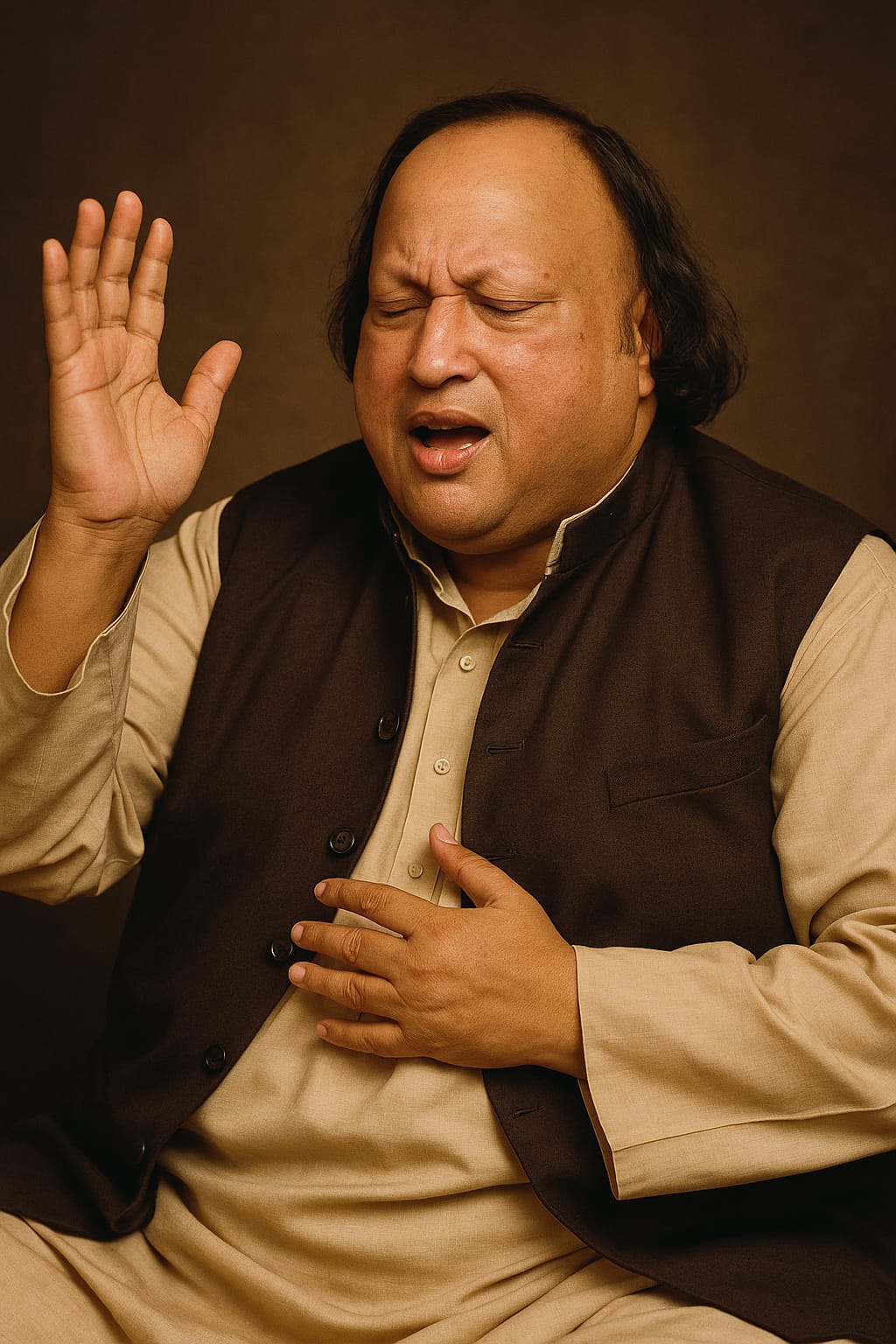Reading time : 2 minutes
In the world of music, few voices have managed to cross boundaries of language, religion, and geography as seamlessly as that of Nusrat Fateh Ali Khan, widely celebrated as the Shahenshah-e-Qawwali the King of Qawwali. Nearly three decades after his passing, Nusrat’s music continues to inspire millions, reaffirming the timeless power of art rooted in spirituality and devotion.
From a Musical Heritage to Global Fame
Born on October 13, 1948, in Faisalabad, Pakistan, Nusrat Fateh Ali Khan hailed from a family with over 600 years of qawwali tradition. His father, Ustad Fateh Ali Khan, and uncles were revered qawwals who passed on to him the intricacies of Sufi devotional music. Although his father initially discouraged him from becoming a musician, Nusrat’s passion for qawwali was undeniable. After his father’s death, he trained rigorously under his uncle, Ustad Mubarak Ali Khan, mastering the complex ragas, rhythms, and lyrical nuances of the art form.
Nusrat’s rise in Pakistan during the 1970s was nothing short of meteoric. With his commanding voice, extraordinary range, and emotional intensity, he transformed qawwali performances into deeply spiritual experiences. His renditions of classics like “Allah Hoo”, “Tumhe Dillagi Bhool Jani Padegi”, and “Mast Nazron Se Allah Bachaye” became anthems of devotion for millions across the subcontinent.
Bridging Cultures and Languages
While qawwali traditionally thrived within the walls of Sufi shrines, Nusrat expanded its reach far beyond. In the 1980s and 1990s, he partnered with Peter Gabriel’s Real World Records, introducing qawwali to Western audiences. His collaborations with global artists such as Eddie Vedder and Michael Brook brought together Eastern mysticism and Western soundscapes, creating a fusion that captivated listeners worldwide.
Nusrat’s music featured in Hollywood films including The Last Temptation of Christ and Dead Man Walking, showcasing the universality of his voice. Critics lauded his ability to communicate intense emotion even to those who did not understand the language. “His music is the sound of the soul,” wrote The Los Angeles Times, while musician Jeff Buckley described him as “my Elvis.”
The Spirit of Sufism
At the heart of Nusrat’s artistry was Sufism the mystical dimension of Islam that celebrates divine love and unity. His performances often drew upon centuries-old poetry by Sufi saints like Amir Khusrau and Bulleh Shah, weaving messages of love, tolerance, and spiritual transcendence. Audiences across cultures found themselves moved not just by the music but by the message — one that spoke of a shared human longing for connection with the divine.
Legacy and Influence
Over his career, Nusrat Fateh Ali Khan recorded more than 125 albums an extraordinary feat that remains unmatched in world music. He received numerous international accolades, including the UNESCO Music Prize, and was listed by Time magazine among the most influential artists of the 20th century.
Sadly, Nusrat’s life was cut short when he passed away in London on August 16, 1997, at the age of 48. Yet, his legacy continues to grow. From Bollywood to Coke Studio, from the works of A.R. Rahman to global pop collaborations, his influence is unmistakable. His nephew and disciple, Rahat Fateh Ali Khan, continues to carry forward the family tradition, keeping Nusrat’s music alive for new generations.
An Eternal Voice
More than two decades after his death, Nusrat Fateh Ali Khan remains a symbol of the unifying power of music. His voice transcended boundaries cultural, linguistic, and religious and brought the spiritual essence of qawwali to the global stage.
In the words of one of his admirers, “Nusrat did not just sing qawwali he made the world listen to the language of the soul.”

